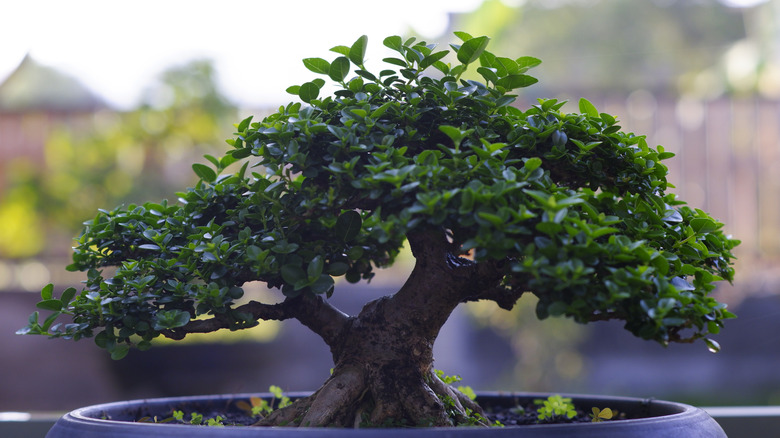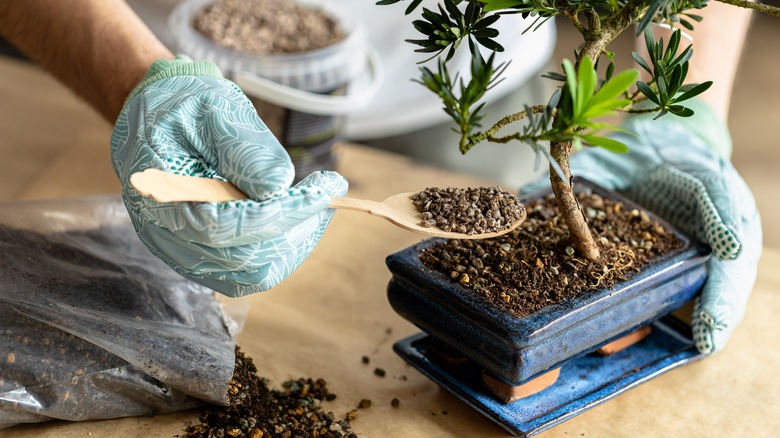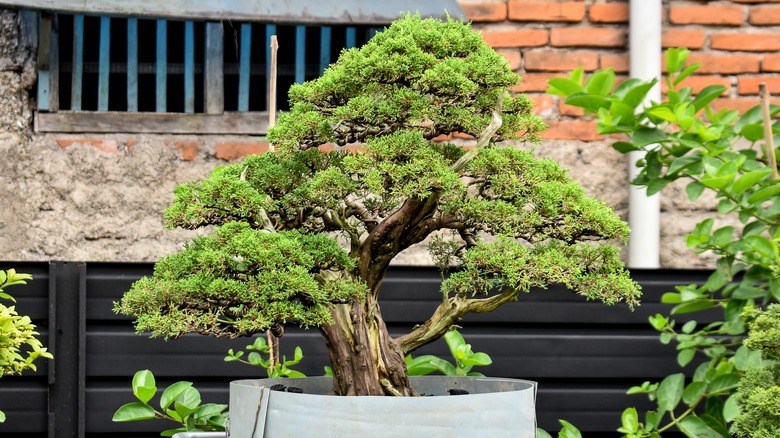DIY Bonsai Soil That Is Sure To Make Your Little Plants Thrive
The art of bonsai dates back to the 13th century, when the Japanese potted and meticulously groomed miniature versions of wild trees. This practice is still popular today, with amateurs and experienced horticulturalists alike turning to the internet to uncover new techniques on how to care for a bonsai. One DIY soil mixture floating around on the internet is thought to make the little plants thrive. It includes a combination of one part sandy loam, one part peat moss, and one part perlite. However, you should think twice before using this bonsai soil mixture. Mr. David Easterbrook, North American bonsai expert, explained why this is not the right choice for optimal plant health while speaking exclusively to House Digest.
"The DIY mix you mentioned, sandy loam, peat moss, and perlite, is not ideal for bonsai," Easterbrook explained. "Sandy loam is generally too fine and tends to compact quickly, which leads to poor drainage and root suffocation. Peat moss is an organic material that breaks down over time and holds too much water, which can cause root rot." He shared that certain types of perlite aren't always harmful for these plants, though. "Perlite can be useful, but only if it is very coarse," the bonsai expert explained. "Overall, this mix does not provide the drainage or structure that bonsai roots require."
Follow Mr. David Easterbrook's bonsai soil advice instead
Since Mr. David Easterbrook advises against using the DIY soil mixture, you might be wondering what alternative would yield better results. Thankfully, the expert detailed the better option for your bonsai plants. "For optimal bonsai health, I recommend using inorganic, well-graded particles tailored to the species, the size of the pot, and your climate," he explained while speaking exclusively to House Digest. This is the key to adequate drainage and healthy roots.
Pines and moisture-loving trees require different soil mixes. It is important to keep this in mind if you are planting and growing either bonsai tree type. Easterbrook shared the details on the ideal soils for these trees. "Pines in particular need fast-draining soil," he revealed. "In Japan, they are often grown in pure granite chips. Depending on the region, the preferred mix might include one-third Fuji sand, which is actually a coarse granular volcanic stone, one-third Kiryu-zuna, a mountain stone high in iron, and one-third Akadama, a granular red clay."
Moisture-loving trees have different needs, too. "For moisture-loving trees like maples, I use a mix of 70 percent Akadama and 30 percent pumice," shared Easterbrook. The expert revealed that organic materials are not ideal because they break down and damage fragile bonsai roots. Opt for inorganic materials instead.
Exercise caution when creating your own bonsai soil mix
If you are interested in creating your own bonsai soil mix, there are also a few other mistakes you need to stay away from to ensure optimal plant health. "I strongly discourage the use of natural soils like loam, which can carry nematodes and soil-borne diseases," Mr. David Easterbrook explained while speaking exclusively to House Digest. "Peat moss tends to compact and restrict drainage. Ocean sand is especially dangerous, as it can contain salt that is toxic to bonsai roots. None of these materials are suitable."
Although it's best to avoid these options, it's totally possible to create a safe DIY soil mix. Easterbrook revealed how to pull this off successfully. "A reliable DIY mix can include equal parts of coir, made from shredded coconut husk and now sold in small chunks, granite chips or silica, often sold as turkey grit, and very coarse grade 4 perlite," the expert shared. "A mix of one-third each of those will support healthy root development in most bonsai trees." If you prefer to use a pre-made mix, Easterbrook recommends a soilless option with Japanese volcanic materials. This could include Akadama, pumice, or lava rock.
The expert went on to share a few final tips to ensure bonsai soil is optimized for healthy plant growth. "While different species have slightly different needs, around 90 percent of bonsai trees do best in soil with a pH between 6.2 and 6.5," he explained. "That is the first thing to consider." Easterbrook also shared that supplying the plant roots with oxygen and moisture is key.


